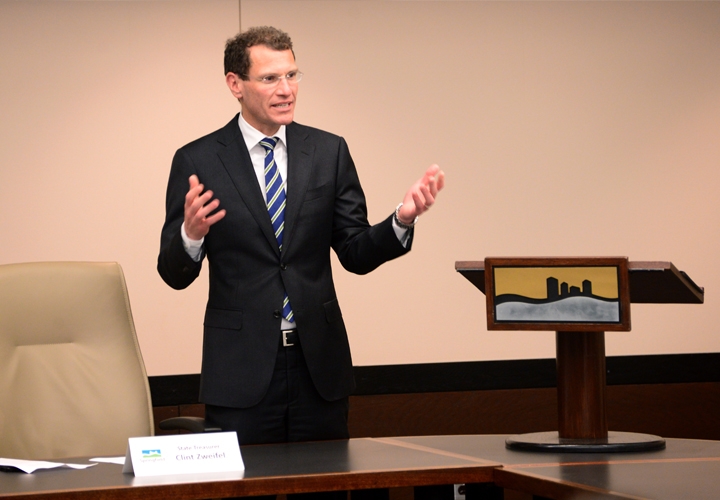State treasurer addresses Missouri’s fiscal health, plans for growth

Missouri is in good financial shape, though the next few years will be crucial in determining whether that healthy outlook continues.
That was the message from Missouri State Treasurer Clint Zweifel when he visited the Chamber on July 7. Zweifel, speaking to the Chamber’s Governmental Relations Committee, is wrapping up his second and final term as the state’s treasurer and chief financial officer. Term limits prevent him from running for the office again.
Zweifel and his team have a large task. He manages the state’s $3.5 billion investment portfolio and more than $1.5 billion in low-interest loans for businesses, as well as the Missouri 529 College Savings Plan (MOST), which boasts $2.5 billion in assets among roughly 150,000 total accounts.
During his discussion, the treasurer mentioned several programs that have grown during his seven-plus years in office.
- The Linked Deposit Program, which works with lenders to provide low-interest loans to businesses, has dramatically expanded its efforts in southwest Missouri. In 2009, the program had $9 million in outstanding loans for this region; since then, more than $465 million in loans have been made in our area, with $70 million currently outstanding.
- Housing development loan programs have taken a stronger interest in funding projects aimed at those with special needs. Local entities have been allowed to define what “special needs” means in their community, allowing assistance for the homeless, those with mental health issues, veterans in need and more.
- Financial literacy requirements are in the works for Missouri high school students. The treasurer noted that curriculum updates are under way and should be ready for students graduating in spring 2017.
Zweifel said the key to continued strength is finding ways for government to add value by offering effective and efficient programs. That means programs run by local communities, supported by strong state infrastructure.
That infrastructure, however, is at a crossroads. While Missouri is financially strong—one of only eight states to maintain a “AAA” bond rating—Zweifel says three issues will largely determine our continued strength.
- Transportation funding – Missouri is 47th in the nation in per-mile funding for highways, and the only real method to address that issue, Zweifel says, is some combination of a gas tax and tolls.
- Higher education funding – The state must be more efficient, reduce duplicated efforts and increase training for workforce development programs.
- Elementary and secondary education funding – In his opinion, the state should be less concerned about meeting a predetermined funding formula and more about funding all necessary programs at the proper level.
“We have a long history of fiscal discipline that comes from both political parties,” Zweifel said, comparing Missouri’s condition to neighboring states. “That’s a real source of financial strength for us, and we should continue to draw on that discipline moving forward.”

